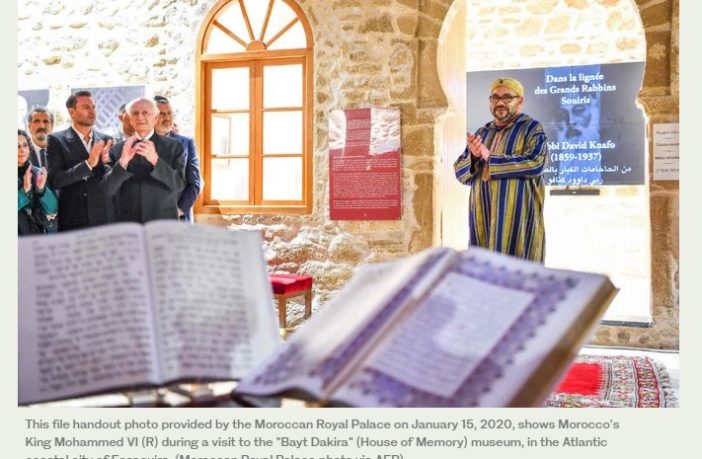Arab News
- Morocco is the fourth Arab nation since August to announce to normalize relations with Israel
- The US-brokered deal followed those of the United Arab Emirates, Bahrain and Sudan
Jewish history and culture in Morocco will soon be part of the school curriculum — a “first” in the region and in the North African country, where Islam is the state religion.
The decision “has the impact of a tsunami,” said Serge Berdugo, secretary-general of the Council of Jewish Communities of Morocco.
It “is a first in the Arab world,” he told AFP from Casablanca.
For years, although the kingdom had no official relationship with Israel, thousands of Jews of Moroccan origin visited the land of their ancestors, to celebrate religious holidays or make pilgrimages, including from Israel.
But Morocco this week became the fourth Arab nation since August to announce a US-brokered deal to normalize relations with Israel, following the United Arab Emirates, Bahrain and Sudan.
Israeli Prime Minister Benjamin Netanyahu said liaison offices would be reopened in Tel Aviv and Rabat, which Morocco closed in 2000 at the start of the second Palestinian uprising, and full diplomatic relations would be established “as rapidly as possible.”
Morocco confirmed the deal, saying King Mohammed VI had told outgoing US President Donald Trump his country had agreed to establish diplomatic relations with Israel “with minimal delay.”
Diverse identity
The decision to add Jewish history and culture to lessons was discreetly launched before the diplomatic deal was announced.
Part of an ongoing revamp of Morocco’s school curriculum since 2014, the lessons will be included from next term for children in their final year of primary school, aged 11, the education ministry said.
The move aims to “highlight Morocco’s diverse identity,” according to Fouad Chafiqi, head of academic programs at the ministry.
Morocco’s Jewish community has been present since antiquity and grew over the centuries, particularly with the arrival of Jews expelled from Spain by the Catholic kings after 1492.
At the end of the 1940s, Jewish Moroccans numbered about 250,000 — some 10 percent of the population.
Many left after the creation of the state of Israel in 1948, and the community now numbers around 3,000, still the largest in North Africa.
Jewish presence in Moroccan culture now appears in the primary-level social education curriculum, in a section dedicated to Sultan Sidi Mohammed Ben Abdellah, known as Mohammed III.
The 18th-century Alawite ruler chose the port of Mogador and its fortress, built by Portuguese colonists, to establish the coastal city of Essaouira.
Under his leadership, the diplomatic and commercial center became the only city in the Islamic world counting a majority Jewish population, and at one point had 37 synagogues.
“While there was a Jewish presence in Morocco before the 18th century, the only reliable historical records date back to that time,” Chafiqi said.
‘Inoculation against extremism’
Two US-based Jewish associations — the American Sephardi Federation (ASF) and the Conference of Presidents of Major American Jewish Organizations (COP) — said they “worked closely with the Kingdom of Morocco and the Moroccan Jewish community” on the “groundbreaking” academic reform.
“Ensuring Moroccan students learn about the totality of their proud history of tolerance, including Morocco’s philo-Semitism, is an inoculation against extremism,” leaders of the two organizations said in a statement published on Twitter last month.
Also in November, Education Minister Said Amzazi and the heads of two Moroccan associations signed a partnership agreement “for the promotion of values of tolerance, diversity and coexistence in schools and universities.”
The accord was symbolically inked at Essaouira’s “House of Memory,” which celebrates the historic coexistence of the city’s Jewish and Muslim communities.
Among those present was Andre Azoulay, a member of the local Jewish community who is also an adviser to King Mohammed VI.
The king, Morocco’s “Commander of the Faithful,” has pushed for a tolerant Islam that ensures freedom of worship for Jews and foreign Christians.
In September 2018, at a UN roundtable, he emphasized the role of education in the fight against racism and anti-Semitism.
Morocco “has never erased its Jewish memory,” said Zhor Rehihil, curator of Casablanca’s Moroccan Jewish Museum — the only one of its kind in the region.
History teacher Mohammed Hatimi said introducing Jewish identity into Morocco’s education program would help nurture “future citizens conscious of their diverse heritage.”
The move will also be part of a revision of the secondary school curriculum set for next year, according to Chafiqi from the education ministry.







